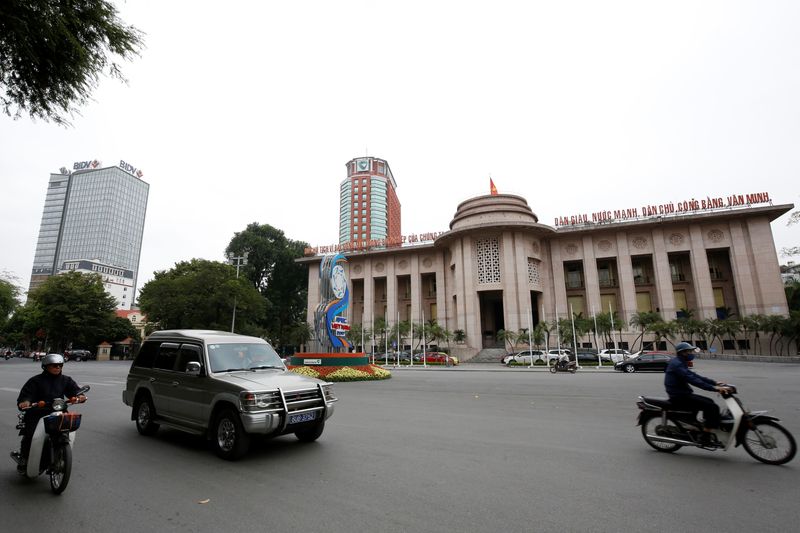Vietnam cenbank raises policy rates by 100 bps
2022.10.24 09:55
[ad_1]

© Reuters. People go past the State Bank building, near the offices of Vietcombank and the Bank for Investment and Development of Vietnam, in central Hanoi, Vietnam November 23, 2017. REUTERS/Kham
HANOI (Reuters) – Vietnam’s central bank on Monday said it would raise its policy rates by 100 basis points, the second increase in a month, in what it said was an effort to head off inflation risks, maintain stability and protect its banking system.
Effective Tuesday, the refinancing rate will be increased to 6.0% and the discount rate to 4.5%, the State Bank of Vietnam (SBV) said in a statement.
Vietnam, like most of its Southeast Asian neighbours, has faced upward pressure on inflation and has seen its currency take a hit in recent months, with the dong losing 9% against the dollar this year.
The SBV said the global inflation level remains high and the Fed had raised its rates five times recently, with more hikes expected during the rest of this year and 2023.
“This, coupled with the strengthening of the dollar, has put pressure on domestic interest rates and exchange rate,” SBV said.
Vietnam’s prime minister last week said Vietnam would keep prices in check and pursue flexible, prudent monetary policy throughout next year, noting that uncertainty over energy prices and the war in Ukraine were behind inflationary pressure.
The country’s main stock index hit its lowest level since January 2020 earlier on Monday and closed down 3.3%, recovering slightly from 4.11% fall earlier.
The dong edged up 0.04% against the dollar at the close, having earlier slumped to a fresh record low for a 13th consecutive session.
Market analysts had earlier said a faster-than-expected gross domestic product growth for this year has offered the central bank some room to raise its policy rates.
The government has said this year’s GDP growth could reach 8%, beating an official target for 6.0%-6.5% expansion and faster than the 2.58% growth last year.
Consumer prices in September rose 4.01% from the end of last year, slightly higher than a government target of 4.0% for the year.
The central bank on Oct. 17 widened the exchange rate trading band to 5.0% from 3.0%, following a sharp fall in the dong currency resulting from fluctuations in the global market.
[ad_2]
Source link








